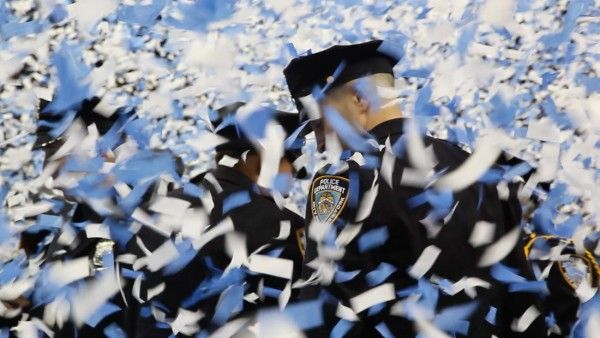Whenever you toss out the term “racism” people are bound to get defensive, and there appears to be a popular consensus that the only true “racists” are KKK members and Neo-Nazis. But as Stephen Maing’s terrific documentary Crime + Punishment shows, racism in our society is far more banal than some pathetic white guy hitting refresh on The Daily Stormer. Maing, with the help of his brave subjects and the damning evidence they collect, breaks down how racist outcomes are the result of tribalism, bureaucracy, and money. Although Maing’s conclusions may not be surprising, they’re nonetheless infuriating.
Crime + Punishment largely follows the “NYPD 12”, twelve minority officers in the New York Police Department who choose to speak out against the quota system (the demand that they make a certain number of arrests and hand out a certain number of summonses every month) that is supposed to be illegal but continues to dictate policy in their precincts. From 2014 to 2017, we see how these officers continue to fight against a system that gets in the way serving the people, prioritizing arrests and summonses rather than justice. We also follow private investigator Manny Gomez (a larger than life figure who should be the inspiration for a weekly TV series) as he tries to help Pedro Hernandez, a teenager wrongfully accused of attempted murder and thrown into Rikers Prison with a bail his mother can’t possibly hope to meet. The documentary ties these stories together by showing how a rotten system creates terrible incentives than ultimately harm innocent people.
Some may look at Crime + Punishment and think, “I watched The Wire! You don’t need to tell me about how numbers-driven policing hurts both departments and communities!” But even though the story may be familiar, that doesn’t diminish its power. If anything, Crime + Punishment seems even more urgent now since we should have changed our system by now. NYPD said it removed quotas in 2010, but instead, those quotas have simply become unofficial with the Police Commissioner able to deny their existence while commanding officers badger their subordinates about meeting numbers. And the reason they’re badgering subordinates is because arrests and summonses go towards generating the $900 million the city depends on. And since poor, minority communities tend to lack the resources to defend themselves against this kind of legalized larceny, we basically have slavery by another name (my mind flashed to Ava DuVernay’s 13th on more than one occasion while watching Crime + Punishment).
To Maing’s great credit, none of this information ever feels dry or perfunctory. Crime + Punishment isn’t a lecture; it’s right in the trenches alongside the officers who are being persecuted for speaking out against injustice. There are moments where, if you heard them secondhand, you’d have trouble believing them, but through hidden camera footage, there’s no denying the NYPD 12. We see how one officer is chastised for wearing a warm hat in the cold because it’s “against the uniform code.” We see another, Edwin Raymond, told point blank by his superior that the higher-ups required a harsh employee review because Raymond had spoken out. Rather than find a way to help communities, the NYPD has fostered a system where it’s easier to go along to get along, silence dissenters, and innocent citizens be damned. And if it’s happening in New York City, it’s doubtlessly happening in other departments across the country.
What’s remarkable is that despite the overwhelming injustice (and there are parts of Crime + Punishment where I was gritting my teeth in anger), there’s hope because of the amazing officers and citizens who are brave enough to fight the system. A lesser documentary would have simply presented the problem and had few answers, but because Maing becomes so embedded with his subjects, we get to see them up close and personal. We see how they interact with communities, how they work together to marry idealism with pragmatism, and how they continue to keep up the fight even though the odds are stacked against them. Crime + Punishment isn’t really about “villains”; it’s about heroes and the enemy is a broken system that needs to change. We can get furious about police brutality, and we should, but as one NYPD 12 member notes, that’s basically the end result of a police force that no longer knows how to interact with the community so they can only meet people with physical force. If every citizen is just a criminal who exists to meet a quota, then everyone is dehumanized.
Crime + Punishment tackles heavy issues and it has no easy answers because this is a complex problem. Cities like New York (which one person describes as “Ferguson on steroids”) probably aren’t willing to forego their millions in revenue, so we need to have a serious talk about raising taxes to make up for that budget shortfall. We need to recognize that police departments that go to greater lengths to protect their practices than their citizens and personnel are in dire need of reform. And we need to recognize that the way racism functions in our society is out in public, and we must stand with those who are brave enough to put their livelihoods on the line to change the system. Crime + Punishment makes that argument clearly, persuasively, and with immediacy.
Rating: B+


